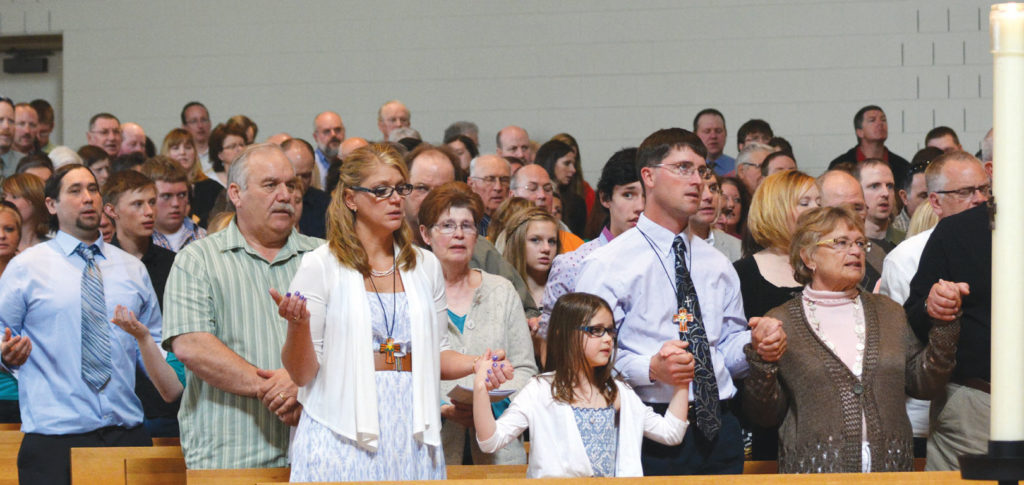
On the evening of the first Easter, the risen Jesus breathes his spirit upon the disciples assembled in a locked room. Breath is the invisible life within us. In this Easter scene the disciples receive Jesus’ spirit rather than fire.
As he dies in John’s gospel, Jesus gives over his spirit (19.30). He says, “It is finished.” His life is about to end. The words also affirm he has completed his mission. Jesus bows his head and dies. For John, this is Jesus’ hour, his glorification. Though Jesus hangs powerless on the cross, he freely gives himself out of love. This lifting up on the cross is Jesus’ enthronement. He hands on his spirit to his followers.
As Jesus stands among his disciples on Easter evening, he shows them his hands and side. John wants us to recognize the risen Jesus is the crucified Jesus. The one who gifts the community with his Spirit is he whose wounds remain in his glorified body. John’s gospel sees an integrity in Jesus’ death, resurrection, and handing over of his Spirit — a single event.
John is unique in not designating the twelve as the receivers of the peace and power of the Spirit. In Sunday’s gospel, the whole community of believers receives peace and the power to forgive.
If the community graciously shares the peace and forgiveness Jesus bestows on them, then the Spirit lives in their midst. It is not the twelve who have a priority on the commission to forgive. Forgiveness, like love and peace, is the community’s to share, for we are the Body of Christ. The commission is ours.
- How does the presence of the Spirit in each Christian help provide ministers in your faith community?
- Whom have you forgiven? How has forgiving or being forgiven renewed you, your family, parish community, or work place?
Our relationships bind families and communities together. How we love and forgive one another matters in concrete, lasting ways. The Spirit is always with us, in our failures and pain as surely as in our joys and achievements. The Spirit stirs in regrets as surely as in moments of communion or shared insights.
To send his friends forth with the good news of Easter, the risen Jesus breathes the Spirit on the community. This is a sacramental scene. Breathing is Jesus’ sign of the Spirit of God’s power in us — invisible but life-essential air, moving into our lungs, heart, and blood, animating every cell of our bodies, coextensive with being alive. The Holy Spirit is a transforming gift in us.
The Spirit calls us always toward peace, unity, and new life. Our prayer, “Come, Holy Spirit,” reminds us to pay attention to the Spirit’s prodding. Where bitterness, grudges, greed, pride, estrangement, addiction put up walls, freeze people out, fray family and friendship bonds, there the Spirit unsettles us, looking to mend.
The Spirit thaws the frozen, bends the stubborn, shakes the arrogant. The giver of life empowers us to be life givers in our relationships and continuously renew the face of the earth.
- What is one peacemaking action you can do?
- What is a peacemaking action you no longer want to put off?
Belief in Jesus includes believing in the God who sent Jesus and the Spirit that Jesus breathes upon the community with the power to forgive and bind. The power of forgiveness the Spirit bestows will act through the community.
In John’s gospel staying in unbelief in Jesus is a sin (8.24; 9.41). Faith in Jesus Christ forgives the sin of unbelief. The faith of the believing community is a source for drawing others to accept Jesus Christ, and thus to be forgiven.
New believers receive the peace and the power of the Spirit. They live because Jesus lives (John 14.19). No one can take their joy away (John 16.22). The Father will give all that the believer asks for in Jesus’ name (John 16.24). Pentecost is any day and every day that we open our hearts to the Spirit who seeks through the believer to renew the face of the earth.
- Imagine a celebration of Pentecost in your parish which expresses the full meaning of the gifts of the Spirit in the Christian community.
